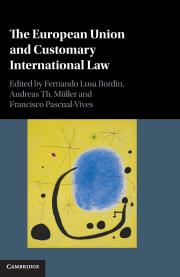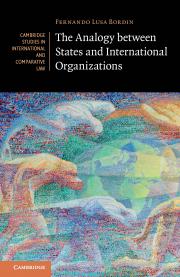
College Associate Professor and John Thornely Fellow in Law, Sidney Sussex College; Fellow, Lauterpacht Centre for International Law
Interests
Public International Law, Jurisprudence, Law of Torts
Research centres and interest groups
CV / Biography
Fernando Lusa Bordin is a College Associate Professor at Sidney Sussex College and Professor of Institutional Law (Schermers Chair) at Leiden University. He is also a Fellow of the Lauterpacht Centre for International Law.
Fernando's research focuses on topics of public international law, including international legal theory, law-making, the law of international organizations, international dispute settlement, the law on the use of force and international investment law. His monograph The Analogy between States and International Organizations was published by Cambridge University Press and received the 2020 Certificate of Merit in a Specialized Area of International Law from the American Society of International Law. (A talk recorded for the UN Audiovisual Library of International Law where some insights from the book are discussed is available here.) Fernando served as a Rapporteur for the Study Group of the International Law Association on the International Law of Regional Organizations, and is an editor of the Oxford International Organizations (OXIO) database.
Fernando served as Assistant to Professor Giorgio Gaja at the UN International Law Commission in the sessions of 2009 and 2011; Judicial Fellow (law clerk) to Judge Cançado Trindade at the International Court of Justice between 2009 and 2010; Research Associate to Prof James Crawford in 2014; Junior Counsel for Mauritius in the Chagos Marine Protected Area Arbitration (Mauritius v UK); Assistant to the ICSID Tribunal constituted to hear the case of Veolia Propreté v. Arab Republic of Egypt (ARB/12/15); and counsel for El Salvador in the proceedings of the advisory opinion on Obligations of States in respect of Climate Change. He has been a Special Advisor on International Law to The Global Fund to Fight AIDS, Tuberculosis and Malaria.
Prior to taking his post in Cambridge, Fernando received an LL.B. (with honours) from the Federal University of Rio Grande do Sul (Brazil), an LL.M. from NYU School of Law (where he was a Grotius Scholar), the Diploma of Public International Law from the Hague Academy of International Law, and a PhD from the University in Cambridge (for which he received the Yorke Prize).
Selected publications
Books
The European Union and Customary International Law (ed), 2022)





 Facebook
Facebook  X/Twitter
X/Twitter  Instagram
Instagram  YouTube
YouTube  Flickr
Flickr  LinkedIn
LinkedIn